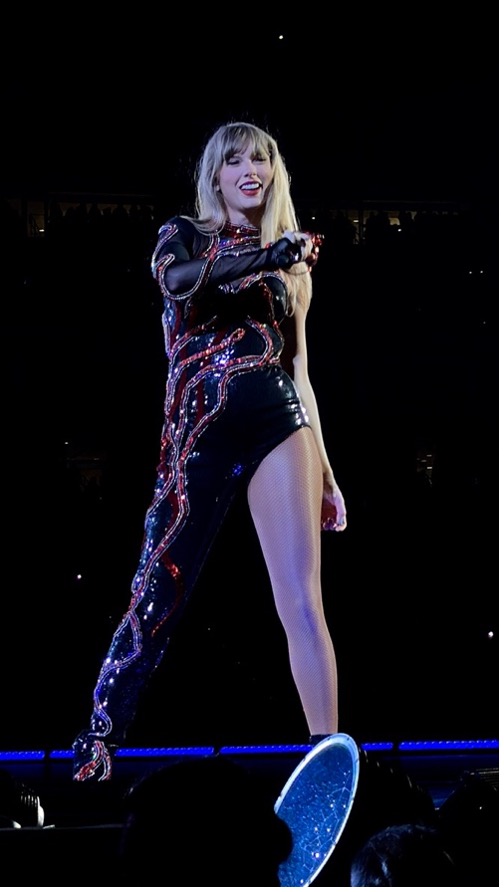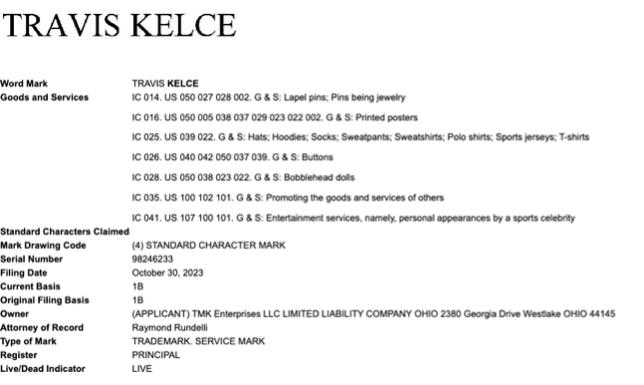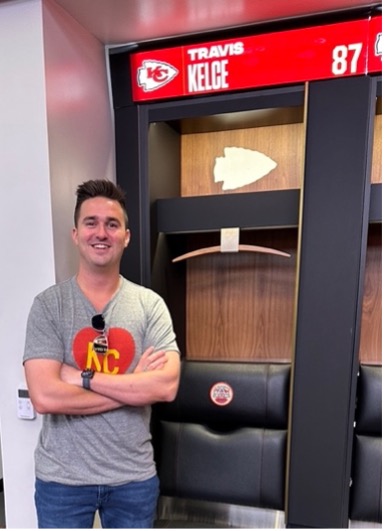
Knew He Was a Killer, First Time that I Saw Him
Eight Pro Bowls. Four First-Team All-Pro Awards. Three Second-Team All-Pro Awards. Two Super-Bowl Championships. One Podcast. We know all too well that Travis Kelce is one of the most accomplished football players in the NFL. From his accomplishments on field to his recent endeavors off-field like his podcast, New Heights, Travis Kelce has accomplished a lot in his first 34 years of life. But what’s gotten him to this level of recognition?
Some say it’s his college football career at the University of Cincinnati. Others say it’s his strong stats in the NFL. People who don’t watch football might say it’s his mom, Donna. He says it’s from “[understanding] the other side of the ball just as well as you know your side of the ball. You feel me? Because everything is predicated off of what I'm doing and what the defense is doing.”
Call it what you want, I say his future business success will come from his new girlfriend, Taylor Swift, and her fearless business team.

Treacherous Trademarks
Just like I explained in Look What You Made Me Blog, trademarks include words and symbols, like logos that help distinguish your goods from other goods. Additionally, trademarks can also be sounds that help identify your goods, like the three chimes for NBC. Trademarks do not have to be registered with the United States Patent and Trademark Office (USPTO) to be owned. Registering your trademark with the USPTO offers greater legal than not registering it.
Specifically, federal registration gives trademark owners the legal presumption of validity and that they own the trademark. Why? Because the USPTO has evaluated trademarks to find that they are in fact valid trademarks in terms of being adequately distinctive to indicate the source of goods and services. Federally registered trademarks give trademark owners the ability to use the “®” symbol after the trademark.

This is Looking like a (con)TESS
Registered trademarks appear in the USPTO’s database, Trademark Electronic Search System (TESS), and can be searched by the public. Whether you’re looking to register a new mark or looking up the marks of your suburban legends, the USPTO’s allows users to find trademarks in the USPTO database. TESS can even help you if you’re searching for a sound you haven’t heard before since all trademarked sounds are in the database.
In the last few years, TESS has received more attention as Taylor Swift’s fans have used it to determine when her re-recorded albums will drop. Once Travis Kelce and Taylor Swift started dating, her fandom also became invested in everything related to Travis Kelce. This includes looking up his intellectual property.
This Love Left a Permanent Mark
Within one day of filing, news of Travis Kelce’s trademark applications flooded social media. Travis Kelce’s lawyers at Calfee, Halter & Griswold filed applications for 1) Travis Kelce, 2) KILLATRAV, 3) Alright Nah, 4) Flight 87, and 5) Kelce’s Krunch. Swifties and Chiefs fans alike were speculating about the timing of the applications and his relationship with Taylor Swift, who has hundreds of trademarks.
But how did he get the idea of applying for trademarks? Did Taylor talk to him about the importance of owning your own intellectual property? Did Taylor talk to his mom while she was telling stories about him on the tee-ball team? Did he talk business with her father? We may never know but we can be appreciative that he is taking advantage of his right to own intellectual property.
Karma is a Good and/or Service
It’s easy to tell when Taylor Swift registers a trademark for a re-recorded album because of (Taylor’s Version) at the end of the mark. what else can TESS show us about how marks are used? More specifically, how will Travis Kelce use these marks?
In TESS, each trademark application includes details such as the mark, associated goods and services, ownership, and more. The goods and services category, defining how marks will be used, is particularly useful for users. The USPTO has established distinct classes of goods, aiding in determining the intended commercial use of the mark
Based on the screenshot of the Travis Kelce mark application, the mark will be used in association with pins, printed posters, clothing, bobble head dolls, and more. The registered trademarks will help the goods establish a strong reputation in the marketplace as they provide Travis Kelce the exclusive use of the marks. Registering in each of these classes would be beneficial if someone were to produce counterfeit goods, as it would strengthen Kelce's ability to pursue legal action for infringement

This Is Why We Can’t Have Nice (Counterfeit) Things
Trademark infringement occurs when a trademark is used without authorization in connected with goods and services, leading to confusion, deception, or mistake about the origin of the goods and services. Should someone create counterfeit goods identical to Kelce’s mark(s), a federally registered trademark would help Kelce sue the producer(s) of the counterfeit goods because of the presumption of validity
Kelce could also have a claim for trademark dilution if the counterfeit goods with the mark diminish the strength or value of the mark. However, for federal trademark dilution, the mark needs to be famous, which might be heard to establish if it’s a new mark.
Ain’t No Use Defending Words that You Will Never Say
Once Kelce’s trademarks are registered, he will need to continue to use the marks in commerce and have them remain distinctive for them to remain alive. Even though trademarks do not have expiration dates, the registration must be maintained for the mark to retain its federal registration. This means Kelce (or his lawyers) will have to provide photographic evidence of the marks being used in commerce for the registration to be used as well as paying maintenance fees.
But is all this work worth it just to have a federally registered trademark? It depends! If you want exclusive use of a mark, you should register your mark. If you are concerned about counterfeiting, fraud, and infringement, you should register your mark. When in doubt, it is typically a safe and sound option to register your mark, both for the commercial benefits and defensive purposes.

Is It Over Now?
Although Travis Kelce is on the older end of players in the NFL, I don’t see his American glory fading before me any time soon. These trademarks are likely a sign that he is taking his off-field pursuits to new heights. It looks like we can look forward to a lot of Travis Kelce merchandise and seemingly cereal!

Ashton Duke
Publication Editor
Loyola University Chicago School of Law, JD 2024